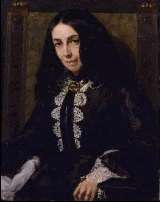
Born: March 6, 1806, at Coxhoe Hall, near Durham, England
Died: June 29, 1861, in Florence, Italy
Elizabeth Barrett Browning was an English love poet who was respected and successful during her lifetime and continues to be influential author. She was the oldest child of Edward Barrett Moulton, a wealthy land owner. When Browning was just fourteen years old, her father privately printed 50 copies of her epic, The Battle of Marathon. The next year, she suffered a riding accident that left her with a lifelong spine injury.
The family settled in London in 1836 where Browning began writing for journals and periodicals. In 1838, her first collection of poems was published under the title The Seraphim and Other Poems. Shortly after moving to the town of Torquay, near the ocean, for her health, Browning's brother drowned. Browning was so traumatized during this time that she became a virtual recluse.
In 1841, she returned to London and worked on modernizing the writings of Chaucer with William Wordsworth and Leigh Hunt. By this time, her writing was widely respected and she corresponded with such writers as Poe and Carlyle. One of her letter-writing admirers was Robert Browning, whom she finally met during the summer of 1845. She had been living with her father, who refused to let her go to Italy when the doctors prescribed it for her health. Without the knowledge of her father, Elizabeth married Robert on September 12, 1846 and left for Italy the following week. Her father never wanted to see his daughter again and returned all of her letters unopened.
Browning's health and writing improved in Italy. The work from this period of her life is the most widely read. Sonnets from the Portuguese (1850), for example, includes the well-known poem "How do I love Thee?" Overall, the Brownings were happy in Florence at Casa Guidi. They had one son, Robert Wiedemann Barrett, who was born in 1849.
During the last years of her life, Browning developed an interest in the occult. However, this had little influence on her popularity in the Victorian period.